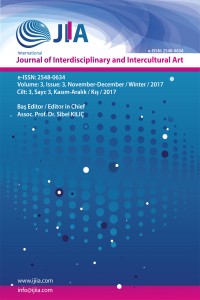Öz
In Greek mythology, Medea is a sorceress who was the daughter of King Aeëtes of Colchis, niece of
Circe, granddaughter of Helios, the god of sun, and above all wife to the hero, Jason. In Euripides’
play Medea, produced in 431 BCE, Jason abandons Medea when Creon, the king of Corinth, offers
his daughter Glauce to Jason. The play based on the myth tells of Medea avenging her husband’s
betrayal by killing their children. On the other hand, contemporary British playwright, Sir Alan
Ayckbourn’s black comedy, Mother Figure, the first ring of the Confusions, mirrors the traumatic
marriage of a contemporary woman, Lucy. The playwright is considered as one of the most significant
dramatists who reflect marital and familial problems of modern, but average British women on his
stage. That’s why the study constructs its main idea over the heroines of both plays. This study
suggests that in terms of the protagonists of both plays, there is a close correlation with Euripides’
Medea and Alan Ayckbourn’s Mother Figure. It analyses the acts of both mother characters in a
similar domestic environment in the face of abandonment considering some former academic works.
Through a new point of view it also points out that in emotional and mental terms, there are some
differences between Medea and Lucy as mothers. All in all this study puts forward that there are
some profound spiritual links while there are some distinguishable characteristics between Medea
and Mother Figure although they are the products of different periods and cultures.
Anahtar Kelimeler
Kaynakça
- Ayckbourn, A. (1983). Confusions: Five Interlinked One-Act Plays. London: Methuen Drama. Beauvoir, S. D. (1949a, 1952b). The Second Sex, trans. H. M. Parshley, New York: Alfred A. Knopf. Billington, M. (1986). Review: Woman in Mind. The Guardian, 5 September. Billington, M. (1990). Alan Ayckbourn. London: Macmillan. Brinzeu, P. (2011). Hidden Esotericm. European Journal of English Studies, 15: 3, pp. 251- 265, DOI: 10.1080/13825577.2011.626954. Coontz, S. (1992). The Way We Never Were: American Families and the Nostalgia Trap,New York: BasicBooks. Euripides. (2007). Euripides: Alcestis, Medea, Hippolytus (Dianne Arnson Svarlien trans.). Indianapolis: Hackett. Dukore, F. B. (1991). Alan Ayckbourn: A Casebook. An Interview with Alan Ayckbourn (pp. 3-23). New York; London: Garland. Holt, M. (1999). Alan Ayckbourn. Relative and Other Values (pp. 12-29). Plymouth: Northcote House. Inchley, M. (2013). Hearing the Unhearable: The Representation of Women who Kill Children, Contemporary Theatre Review, 23:2, 192-205, DOI: 10.1080/10486801.2013.777049. Karlson, E. K. (1993). Laughter in the Dark: The Plays of Alan Ayckbourn. London; Toronto: Associated University. Kristeva, J. (1986). ‘Stabat mater’, in The Kristeva Reader, ed. Toril Moi, trans. S. Hand, Oxford: Basil Blackwell, pp. 160-186. Mastronarde, D. J. (2010). The Art of Euripides: Dramatic Technique and Social Context. Cambridge; NY: Cambridge University. Mitchell-Boyask, R. (2007). Euripides: Alcestis, Medea, Hippolytus. Dianne Arnson Svarlien (trans.). Introduction and Notes (pp vii-xxxvii). Indianapolis: Hackett. Morales, H. (2007). Classical Mythology: A Very Short Introduction. Oxford: Oxford University. Purkiss, D. (1999). The Children of Medea: Euripides, Louise Woodward, and Deborah Eappen. Law & Literature, 11: 1, pp. 53-64, DOI: 10.1080/1535685X.1999.11015586. Ruddick, S. (1995). Maternal Thinking: Toward a Politics of Peace, 2nd. ed., Boston; MA: Beacon. Sirola, R. (2004). The Myth Of Medea From The Point Of View Of Psychoanalysis. The Scandinavian Psychoanalytic Review, 27:2, 94-104, DOI: 10.1080/01062301.2004.10592947. Thurer, S. L. (1994). The Myths of Motherhood: How Culture Reinvents the Good Mother, Boston; MA: Houghton Mifflin. Vassillopulos, C. (2014). Through A Glass Darkly: Medea as a Reluctant Goddess. Jung Journal: Culture&Psyche, 8: 1, pp. 41-56, DOI: 10.1080/19342039.2014.866033. White, H. W. (1984). Alan Ayckbourn. Absent Friends and Confusions, (pp. 67-79). Boston: Twayne Publishers. Whiteley, R. (1983). Confusions: Five interlinked one-act plays, Alan Ayckbourn, auth. Commentary (pp. viii-xxiii). London: Methuen Drama Student Edition.
Ayrıntılar
| Birincil Dil | İngilizce |
|---|---|
| Bölüm | Makaleler |
| Yazarlar | |
| Yayımlanma Tarihi | 31 Aralık 2017 |
| Yayımlandığı Sayı | Yıl 2017 Sayı: 3 |


